



|

|

|
|
2007/07, July Photofictional, A Daily Blog Posting By Bryan Costales
|
|
 | |
|
What runs through a man's mind just before a race?
Does he think of strategy and the effort about
to be spent? Does he remember dinner the night before and
wonder if the mix of carbs to protein was right?
Does he worry about getting to work on time afterward?
A beginning is a curious place to pause. It is a rare moment when all seems possible. Contrast that moment to the finish when the outcome is known and when all possibilities have vanished. Where is the beginning? For a race, the beginning is obvious. At some point a flag will drop or a gun will fire and the race will begin. But for other activities the beginning is less clear. Does a date begin when your request is agreed to? Does it begin when you meet at the front door or when you sit down to dine? Did it begin when the idea first crossed your mind? Does a camping trip begin when you first throw a dart at the map? Does it begin with that first trip to REI to buy the latest stuff? Does it begin when your Tilley hat arrives in the mail? Does it begin when you drive off, or when you park there? A poet might fault the sleeper for a false start when his foot slips and strikes the snooze bar. The novelist might review the entire day-before's events in that moment before the alarm is silenced. The filmmaker might steady-cam the alarm as it falls to the floor and rolls languidly down the stairs. But to a man sitting on a bicycle, calmly waiting for the slowest bike race to begin; To such a man, under the warm sun refreshed by a hint of sea breeze; To such a man, the possibilities are infinite. The race has yet not started. And history has not yet happened. (2007) Slow bike race, Tour de Fat, San Francisco • Photo posted Monday, July 23, 2007 • © 2007 Bryan Costales 
 #BP20070723.jpg Add a comment or report a mistake
|
|
|
 | |
|
A bubble
has a short lifetime. Shorter than insects and, in fact,
shorter than most things other than some sub-atomic particles.
A bubble's life begins when a soap film gathers around a chunk of
air. If the day is warm or breezy, a bubble may seem to rise for a while,
then descend. Almost anything can disrupt the surface of soap film,
a mote, a feather, even a gentle blade of grass. When the surface of a
bubble fails, the bubble bursts. Air rushes out and a drop of soap gathers
and falls to the ground. A tiny splat of moist is all that marks the
end of a bubble.
But while a bubble exists, what magic it brings to the world. On the surface of each bubble is a rainbow. Like a pearl, a bubble shines and reflects as it floats. Children like to catch them and make a special effort to keep them from breaking. A dog will chase and try to bite a bubble. The 60's saw the evolution of giant bubbles the size of watermellons and larger. Giant bubbles are rarely spheres. They are too big and sloppy to form themselves into compact shapes. They wobble and writhe and when they burst, they tear and fall apart in the same sloppy manner in which they lived. Tiny bubbles are possible too, but soap dominates as the air grows smaller. Tiny bubbles fall quickly and burst when they hit the ground. Tiny bubbles are no fun unless they are in wine, and then they rise to the occasion. (2007) LGBT Parade, Market Street, San Francisco • Photo posted July 2, 2007 • © 2007 Bryan Costales 
 #BP20070702.jpg Add a comment or report a mistake
|
|
|
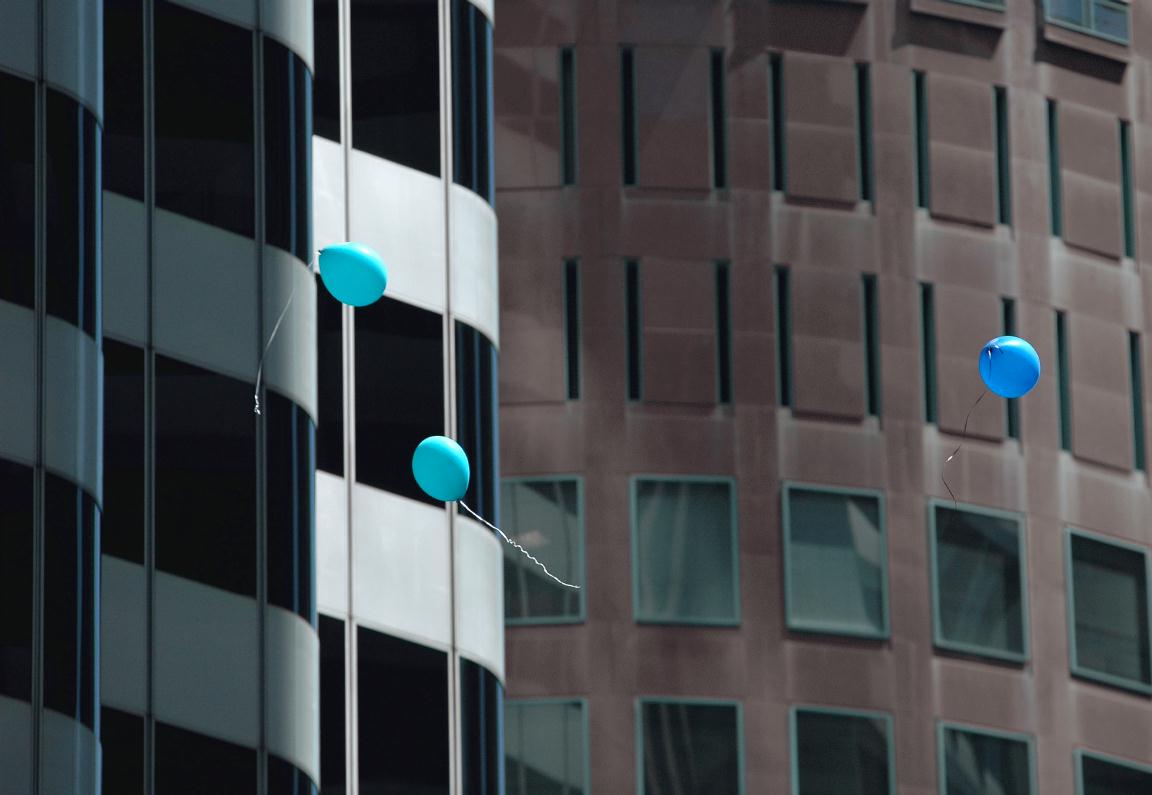 | |
|
Go outside to your front steps, your deck, or your patio. Lie
on your back and hang your head back over a step or a rail.
Look at the world upside down.
Not everyone can do this. Not because they are unable, but because they fear a world in which it is possible to fall up. In childhood, the Three Balloonos thought they would be normal balloons, filled with air and dropped to the floor as part of a balloon drop at new years. Earlier that week they were sold to a happy man who loved their color. He filled them with helium and tied them to a float with white ribbon. The Three Balloonos had never dreamed they would ever be filled with helium and found the feeling heady.
The Three Balloonos disliked the cheering masses and the loud music.
They wiggled their ribbons and escaped. But instead of falling, they
rose into the air. With the agility of acrobats they whipped their
ribbons around a streetcar wire
In the distant Pacific ocean, the day before, a front had begun to move south. As its edge passed over the City this day its gradient caused a breeze. Not much of a breeze to be sure, but enough to wobble the Three Balloonos. Suddenly their strings gave way and they fell upward into the sky. Balloons cannot speak, but if they could, perhaps, the Three Balloonos would say, "Yippee!" or "Oh no!" When lying there with your head upside down over a step, keep an eye peeled for balloons. You may someday spot three balloons falling into the sky. When you do, notice with your head upside down, that the balloons are now falling down. (2007) LGBT Parade, San Francisco, California • © 2007 Bryan Costales 
 #BP20070703.jpg Add a comment or report a mistake
|
|
|
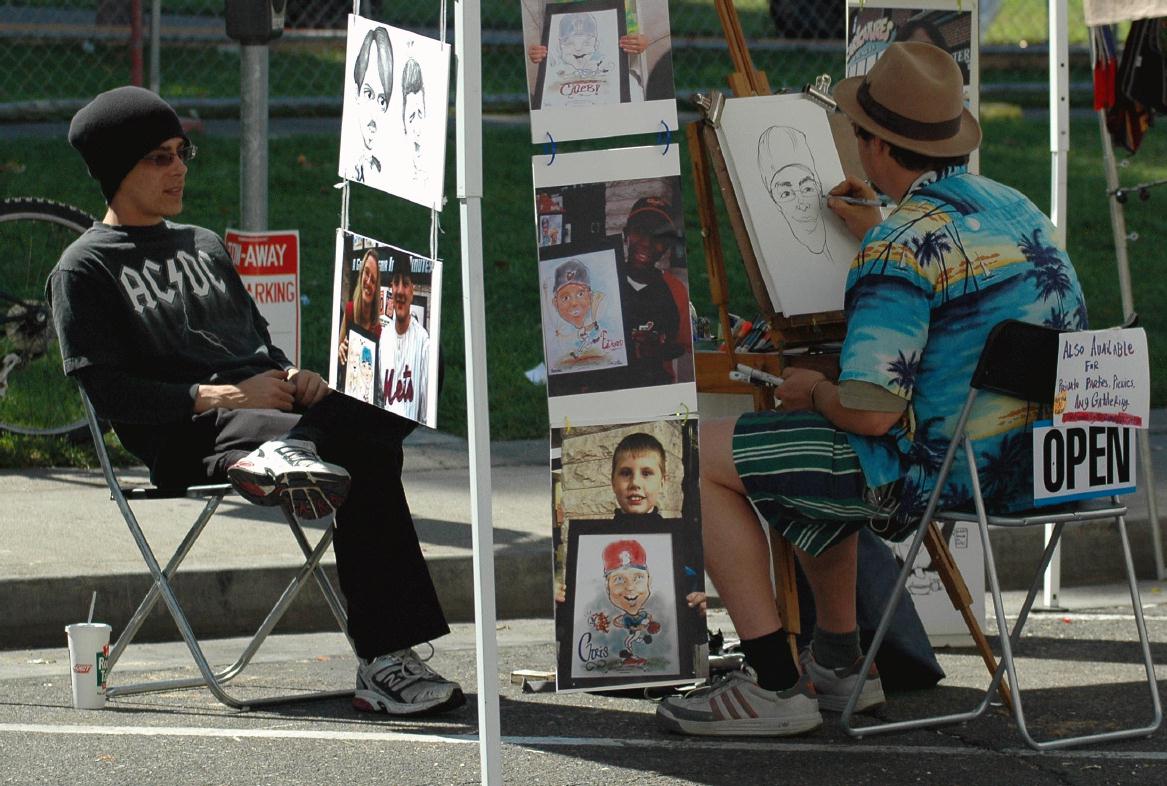 | |
|
If you ever talk to an artist at a fair or festival, one thing
you will doubtless discover is that the hardest part of creating
art is selling it.
One method, as shown here, is to create art
on the spot, charging for each custom creation. This can be done
with drawings, of course, but with other art too,
such as
photography.
A more common method is to display one's art in a booth or gallery and wait for passers by to purchase something. This is a much less exciting way to sell, but has the advantage of fetching better prices than custom created art. The display form of selling works well for everything from street art to high-end museum quality art. A third means is to not sell at all. At this site, we offer everything for use for free. But even here we also allow anyone to purchase rights or originals from the copyright holder. Writers have it harder than visual artists because the number of works per year is far lower. A novelist, for example, might require two or three years to create a single novel. A novelist cannot simply set up a booth at a fair. One book looks less impressive than dozens of paintings. A book, as they say, is best not judged by its cover. Instead the customer must read a bit to decide whether to purchase or not. It is fortunate that artists create for the love of the art they create. If they created only to sell, we might never see any new art. (2006) How Berkeley Fair, Berkeley, California • Photo posted Wednesday, July 4, 2007 • © 2007 Bryan Costales 
 #BP20070704.jpg Add a comment or report a mistake
|
|
|
 | |
|
Little Billy arrived at his 6th grade class with two dollars in
his pocket and a mission from his mom. "Billy," she had told him before
he left home that morning. "Here's two dollars. I want you to stop
by the store on the way home and pick up a really good vegetable."
"What kind?" he asked. "Oh, I don't know. I'll leave that up to you. Try to pick something really nourishing and tasty." Just before lunch, Billy always spent an hour studying in the library. On this day, he pulled a dozen books off the shelves and compared the nutrition of many different vegetables. In cookbooks he found recipes for steamed and boiled vegetables. As lunch approached he decided that asparagus would be his choice. The only problem was that he had never tasted asparagus. In line for lunch, Billy asked the lunch lady, "Do you have any asparagus I can taste?" "Sorry, kid," she gestured with a large spoon. "That's middle school food." Billy mulled this news over and decided he would just have to trust his well researched decision and get asparagus untasted. After school, Billy stood in the store facing stacked bunches of asparagus each labeled $2.50 per bunch. He felt the two dollars in his pocket and gulped. Just then he noticed his "friend" Andy looking through the refrigerated soda case. "Andy," he called, "Come here." To Billy, Andy had always seemed like a Binky to his Brain. Gentle, but not too bright. "Hi Billy." "Andy," Billy smiled. "Can you take one of those bundles of asparagus and drop it on the floor for me?" "Why don't you do it yourself?" "I want to get it cheaper, but don't want to lie if I'm asked if I dropped it." Andy scratched his ear and thought about the strange request. He decided it wouldn't hurt anything, said, "Okay," and knocked a bundle to the floor. As Andy walked back to the soda display, Billy called to the owner. "Sir," he said. "I found these asparagus on the floor. Can I buy it for two dollars?" "Did you drop it on the floor?" "No," Billy declared, certain of the truth. "I didn't do it." The owner looked around and noticed Andy. "Hey kid," he shouted, "Did you drop this on the floor?" "He told me to," Andy said and pointed at Billy. The owner glared at Billy. "You should be ashamed of yourself. I'm going to rinse these off and when I get back I want you gone. You hear me, you little liar. I want you gone." Billy felt himself starting to cry. Not only didn't he get the asparagus but he would never be able to shop there again. He felt the weight of the world falling in on him and cried harder. He knew his mother would want to know why he came home without a vegetable so he cried harder. The owner asked, "What are you doing?" Billy looked up and was surprised to find himself sitting on the floor wet tears on his face. "Tell you what," the owner said. He lifted a bundle from the shelf and pulled a couple stalks out. "There," he held the bundle out to Billy. "I can sell this to you for two dollars." Billy stood and wiped his nose. He took the bundle from the owner and mumbled, "Thanks." The owner stared at Billy and shook his head. "You are the sorriest kid I ever saw. Why didn't you just ask if you could buy fewer for less?" The owner walked away, still shaking his head. Billy was sad as he walked home. But later, when he tasted asparagus for the first time in his life, the whole day suddenly seemed worth it. (2007) Store across from Japan Town, San Francisco • Photo Posted Thursday, July 5, 2007 • © 2007 Bryan Costales 
 #BP20070705.jpg Add a comment or report a mistake
|
|
|
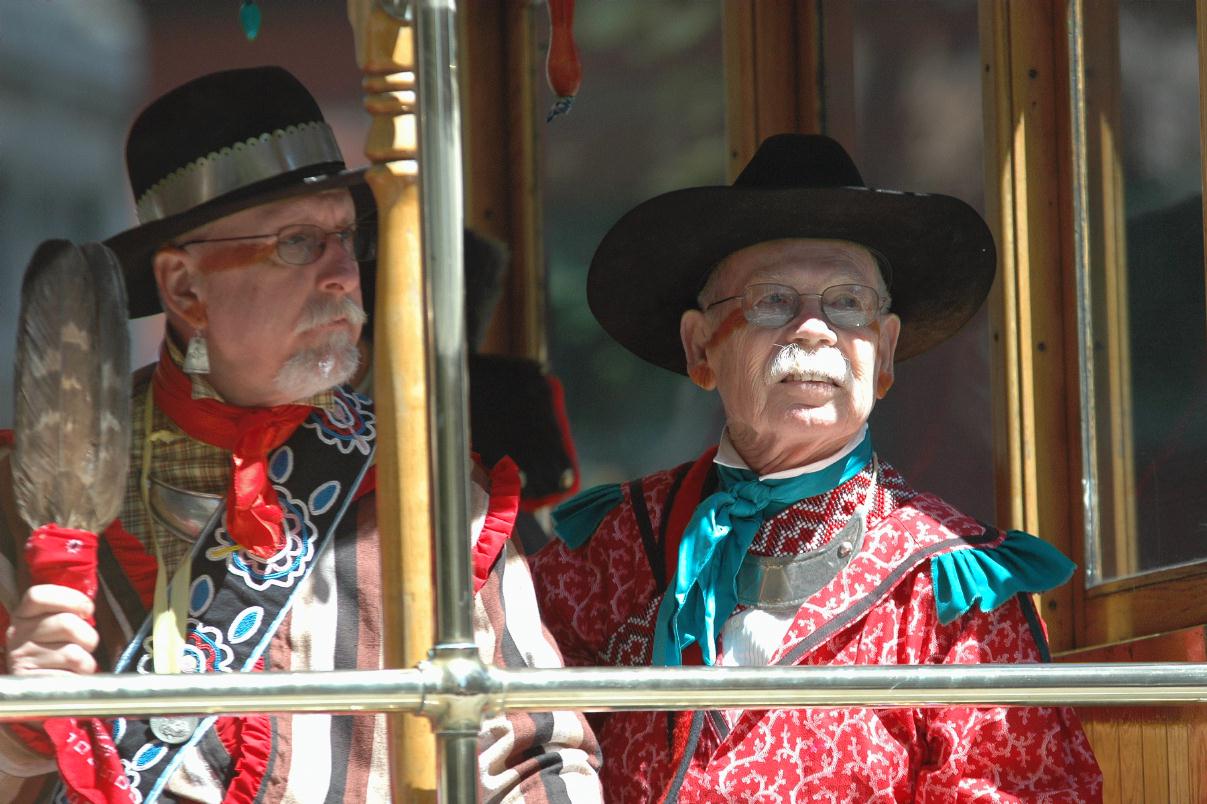 | |
|
If you have seen Brokeback Mountain, you can imagine why
one would oppose marriage for such two-timers as those two.
Each was married with children, yet the two (movie star caliber)
handsome men loved each
other in a world that feared and hated such love.
But look at the two men in this photo. No one could ever be so unkind as to deny marriage to gentlemen such as this. Clearly these men have managed to arrive honorably into the present where they are riding a faux cable car in a parade honoring love such as theirs. In the same way we tend to wish one standard on the young and another on the old. Such differences exist no matter our preferences. A young woman, for example, should not marry too young. But a middle aged woman might seem abnormal still unmarried. In a similar manner, it will not be the young virile men who will someday win the right to marry. Instead it will be the honorable looking middle aged and older men who eventually win that right. Staying together for seventeen and twenty years grants marriage more a look of legitimacy than any amount of muscular tan ever could. 2007 Lesbian, Gay, Bisexual, Transgender Parade • (2007) LGBT Parade, San Francisco, California • © 2007 Bryan Costales 
 #BP20070706.jpg Add a comment or report a mistake
|
|
|
 | |
|
Young girls are given dolls with which to play and fantasize. Young boys too can be given dolls, but those dolls are usually called action figures or play cars. No matter what kind of doll a child possesses, each can use that surrogate figure to play at rehearsing life scenarios. A lady doll is dressed properly to apply for a business job but is still turned down by a sexist boss. A soldier is given the maximum number of guns yet is still blown to bits by the unfair advantage of a tank. Children use dolls to explore life. They experiment with social interaction on an experimental basis. They can learn without bringing harm to themselves or others. The young girl can rehearse being asked for her hand in marriage in endless variation until she sickens of the whole matter and resolves to remain single for the rest of her life. A boy can fight fires over and over until boredom drives his thoughts to police work. Teenagers lose the ability to play with dolls. Instead teens experiment using each other and therein find more hurt than they ever bargained for. Young adults fare no better and, in fact, all adults suffer because they can no longer experiment in life using surrogates. Instead adults must experiment with life on life's terms not their own. Dolls arranged around a tea set gossip about boys. Even though the words spoken by the child are maudlin, that pretend interactions is more real and requires more from the child than any video game or TV show ever could. Dolls are to children as art is to adults. The author, the poet, the artist, the musician all play with dolls as adults. Sure, they don't call them dolls but their art performs the same purpose. Art is the artist's way to experiment with life. This essay, for example, is a means to examine how art can affect the reactions of others. The poet visualizes in metaphor and so visualizes in dreams, the ultimate metaphor. The lyricist tries to be a boxer one day, and to be a clown the next. Artists have what most adults lack. Artist still play with dolls. So. If you are not an artist, at the very least, try to daydream of dolls. END © 2007 Bryan Costales 
 #BP20070707.jpg Add a comment or report a mistake
|
|
|
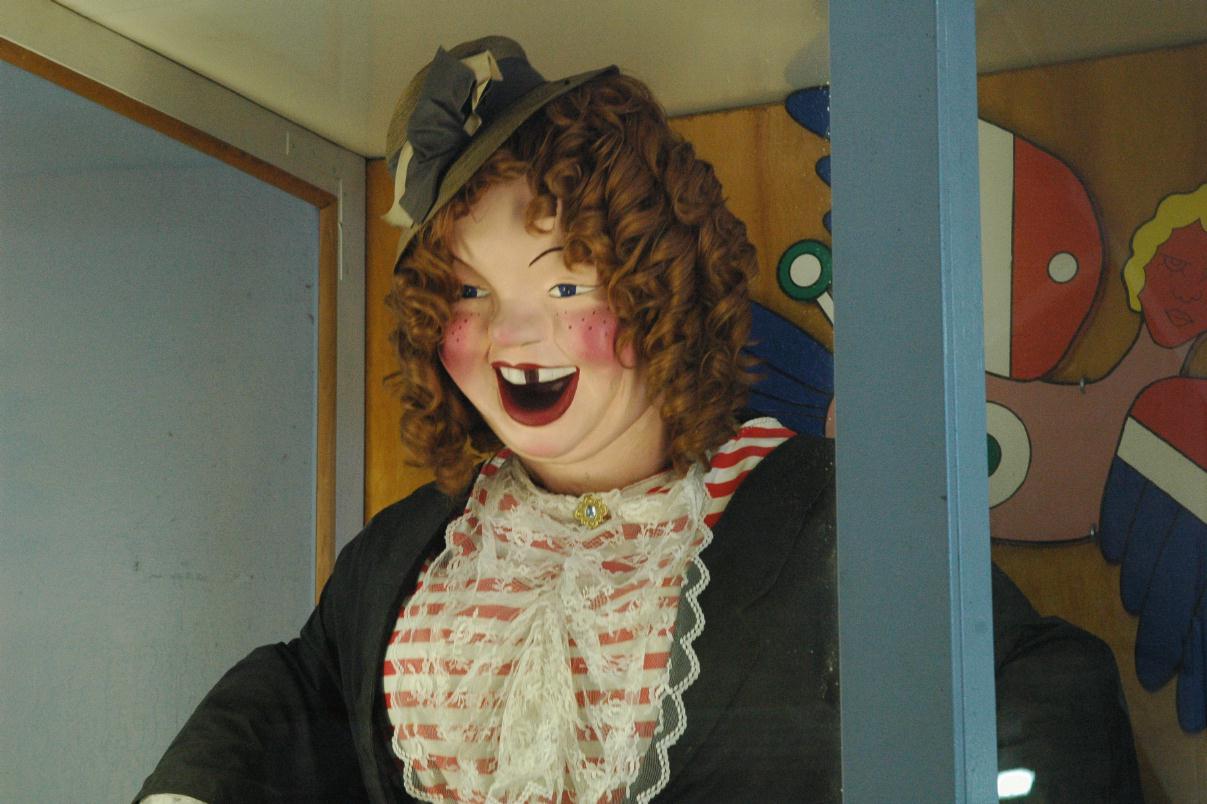 | |
|
Born in the 1930s in Philadelphia, Laughing Sal, and her
Laughing Sam
Sal's fame spread. Her skill at frightening children with her never-ending,
free laugh
made her famous. But those heady times could not last forever.
In the 1970s, Playland closed and Sal became an orphan.
(2007) Musee Mechanique, San Francisco, California • Photo posted Sunday, July 8, 2007 • © 2007 Bryan Costales 
 #BP20070708.jpg Add a comment or report a mistake
|
|
|
 | |
|
Alcatraz Island was a prison. I once overheard a person viewing
Alcatraz to say, "They had it good. They had windows. Modern prisons
don't have windows."
Now this might make you think that prisoners have it worse now. But California prisons are in trouble because they are not providing prisoners with good enough health care. The courts have decided that prisoners are captive without ability to seek health care outside, so the state must provide for all their health care. Prisoners have full, comprehensive health care (including dental and mental care, and pharmaceuticals) completely paid for by the state. If a grocery store owner replaces a plate glass window, he could do it with safety in mind and hire a glass company to replace it. Or he could seek to maximize profits, and choose to just hold the plate glass in with tape. One hot afternoon the tape gives way and falls onto a passerby. The unfortunate pedestrian is killed. The store owner is charge with a crime, negligent manslaughter, and sent to prison. A pharmaceutical company releases an ill-tested new drug. TV advertising causes millions to buy and take the new drug. One of every 100,000 people reacts badly to the drug and dies of heart failure. The pharmaceutical company tried to maximize profits by spending less to study the new drug. Despite deaths, no one from the pharmaceutical company is ever charged with a crime. An HMO decides ahead of time that a certain procedure will not be covered despite the occasional need for it. This decision is intended to reduce costs and thereby increase profits. Because of this decision people are denied a needed procedure and die. Despite the incorrect reason for denying a procedure, no one at the HMO is ever charged with a crime. Most of the people in prison were not charged with causing a death. Many, in fact, are in prison having harmed no one other than themselves. The store owner is sent to prison where he is given free health care. The CEO of the pharmaceutical company can have caused thousands of deaths selling bad drugs or over charging for needed drugs, yet remains free. The CEO of an HMO can have caused thousands of deaths by setting policies that favor profits over treatment, yet remains free. The only cure for such a topsy turvy world is to make health care a right. (2007) Alcatraz Island, San Francisco, California • Photo posted Monday, July 9, 2007 • © 2007 Bryan Costales 
 #BP20070709.jpg Add a comment or report a mistake
|
|
|
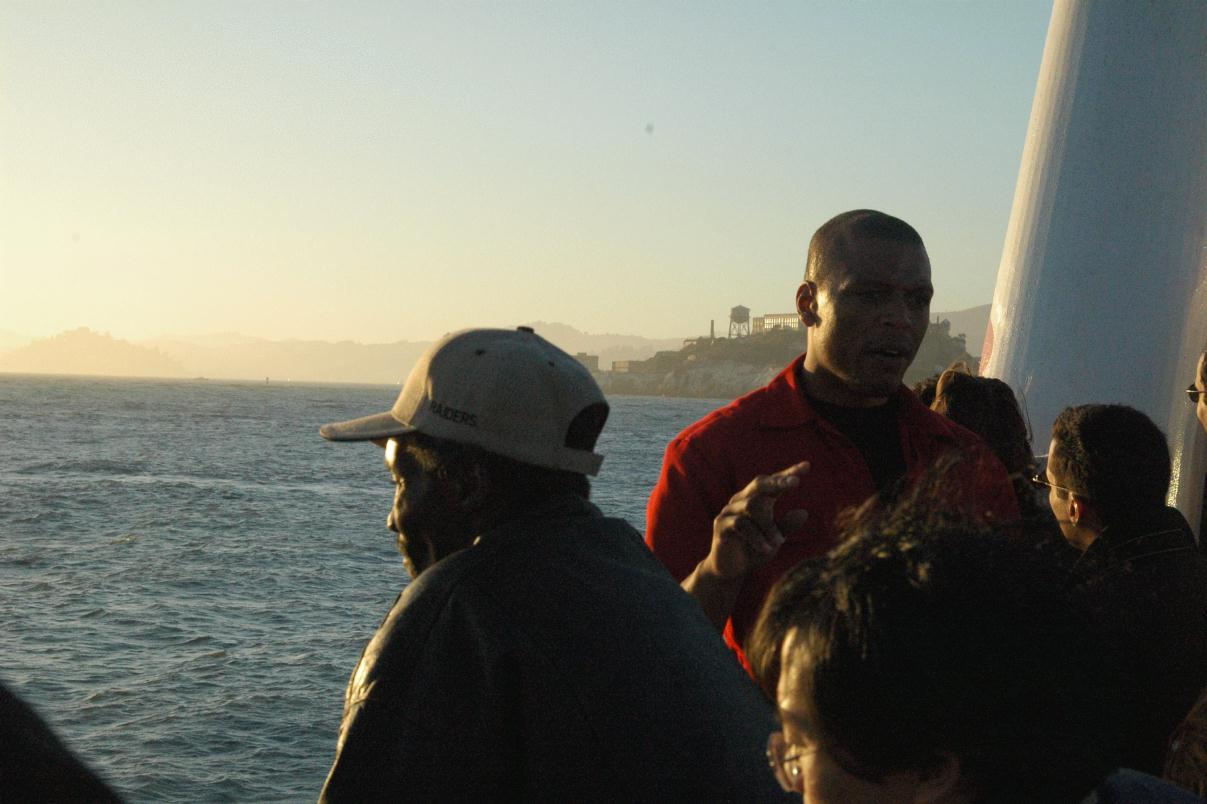 | |
|
The
Red and White fleet
of ferries offers a July 4th special for viewing the
Independence Day fireworks on the bay. The cost is reasonable
(half the cost of competitors who also sell food) and
sells liquor, soft drinks, and chips for snaking.
The captain of our boat was the most
aggressive on the bay that night. In addition to a close
trip around Alcatraz Island he parked the ship as nearby
as legal to the fireworks barge.
This July 4th, two fireworks barges were employed. One parked in the bay off the Palace of Fine Arts, the other off Pier 39. The two barges were connected by radio and computers and both launched fireworks in tandem to music transmitted over an FM radio station. To provide the best view our Ferry was driven hard against its turned rudder. This caused the boat to tilt to the starboard a few degrees. Because of the swells, the effect was like standing on the side of a hill during an earthquake. Not uncomfortable, just tiring. At the end of the evening we walked down Embarcadero toward home. The sidewalks were jammed with people leaving. Cars were gridlocked. Buses ran along the trolley right-of-way, bypassing cars, but took so long to load and unload that they too began to back up. Dozens of sidewalk stalls and tables were set up and sold everything from knit wear to CDs. Unfortunately there were so many people leaving that the tables acted more like choke points than sales points. The double whammy that night was the display of fireworks over the ball park. Those fireworks began just as we arrived home providing desert for what turned out to be an earlier satisfying meal. (2007) July 4th Fireworks, San Francisco, California • © 2007 Bryan Costales 
 #BP20070710.jpg Add a comment or report a mistake
|
|
|
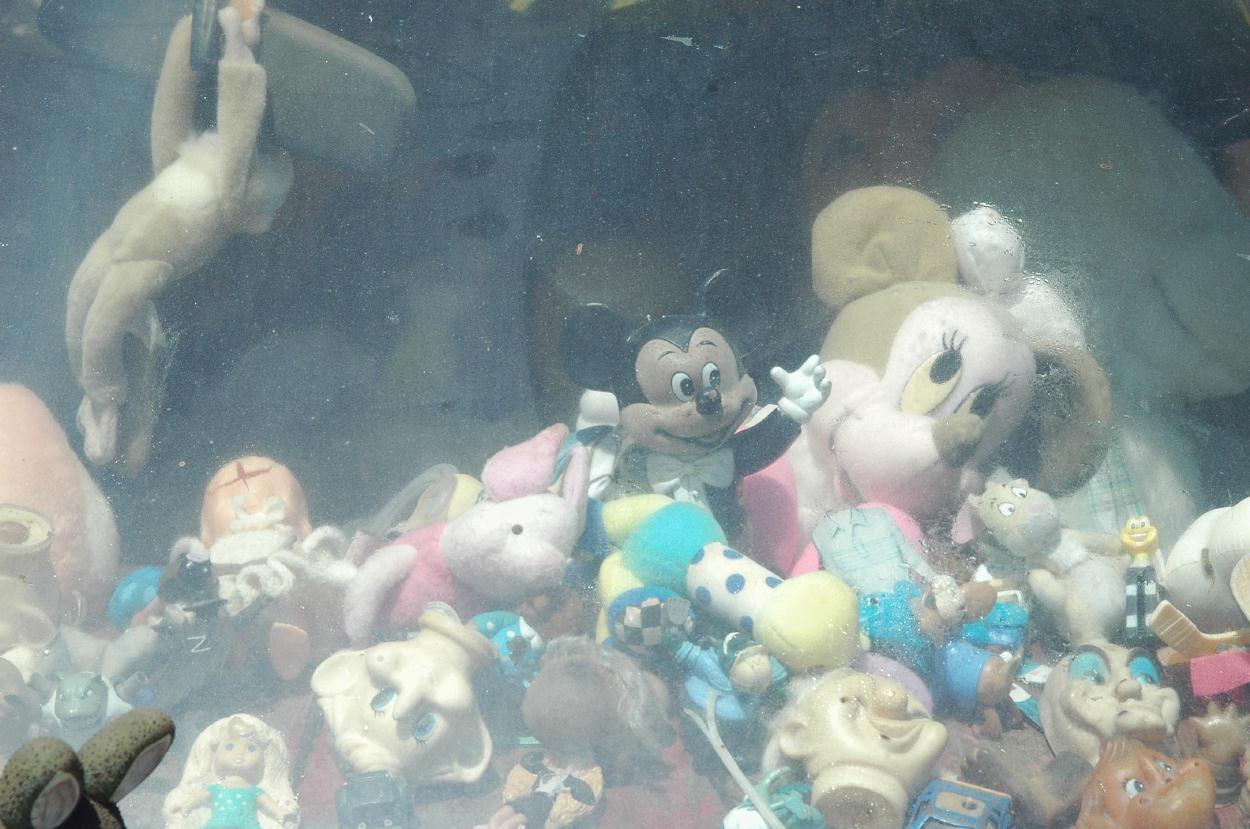 | |
|
Mr. Bunny was a happy go lucky guy who loved nothing more
than bringing happiness to small children. He was a toy
bunny that loved to be snuggled and petted and would squeak
when squeezed for reasons that were beyond him. He had been
purchased second hand, but that seemed never to matter.
He took life in stride and never troubled anyone.
One day a gruff discussion was heard somewhere deep in the toy box. Mr. Bunny could not make out the words, but the tone worried him. The voice sounded angry, and that was very unusual for toys. A worried stuffed Mr. Moose leaped from the box and skidded to a stop near Mr. Bunny. "Terrible, terrible," Mr. Moose said. "Some of the toys say you were once owned by a girl who had gay parents." "That's true," Mr. Bunny replied simply and scratched an ear. "I don't believe I ever hid that information from anyone." "Fag toy!" came a shout from the toy box. "Fag toy!" Soon dozens of toys were yelling the same thing. "You'd better run," Mr. Moose cautioned him, and nodded toward the door. Mr. Bunny instead noticed the open window and leaped for it. He flew out and landed on the lawn unhurt. He heard the chanting behind him and kept going. He hopped down the alley and across the park and finally came to the bay. Parked near the bay was a strangely decorated car. Inside he heard the whispering of hundreds of toys. He had to cross by it, so ducked low and tip-toed past. He was halfway across when a toy noticed him. Fearing that they too would yell things at him, he bolted and was quickly past the car and almost to the water. Mr. Bunny could not think too far ahead, after all he was just a toy, but he glimpsed something akin to death in his future and wanted to leap into the bay water. He reached the edge and, without hesitation, jumped. A hand grabbed him in mid flight. It was a little girl's hand. She hugged him close and ran home with him. "You saved me," the little girl said to Mr. Bunny. "I was running away from home and I found you. Now I want to go back home again." She held him up and looked at him. "You're dirty," she said. "But I'll kiss you anyway." She did, and later he became her favorite toy. She kept him for years and years, until she was old and frail. When she died, her children buried Mr. Bunny with her and together they gave their cells over to an oak tree. And on that oak tree, years later, another little girl carved the words, "I love Mr. Bunny." And that oak tree, that was partly the toy Mr. Bunny, loved her back. (2007) Art Car, Sausalito, California • Photo Posted Wednesday, July 11, 2007 • © 2007 Bryan Costales 
 #BP20070711.jpg Add a comment or report a mistake
|
|
|
 | |
|
The Jeremiah O'Brien
is one of a class of liberty ships built during World
War II. The federal government moved into Sausalito, raped the
land, and entered the ship building
business in the mid-1940s.
It was necessary to build ships quickly to help fight the war.
After the war, the shipyards were deeded back to the city of
Sausalito and over the years that land has evolved into some
of the most
expensive land in the Bay Area.
The only sign that remains of the old shipyards are a few
street names and an exhibit inside the Bay Model.
(2007) San Francisco Bay, San Francisco, California • Photo posted Thursday, July 12, 2007 • © 2007 Bryan Costales 
 #BP20070712.jpg Add a comment or report a mistake
|
|
|
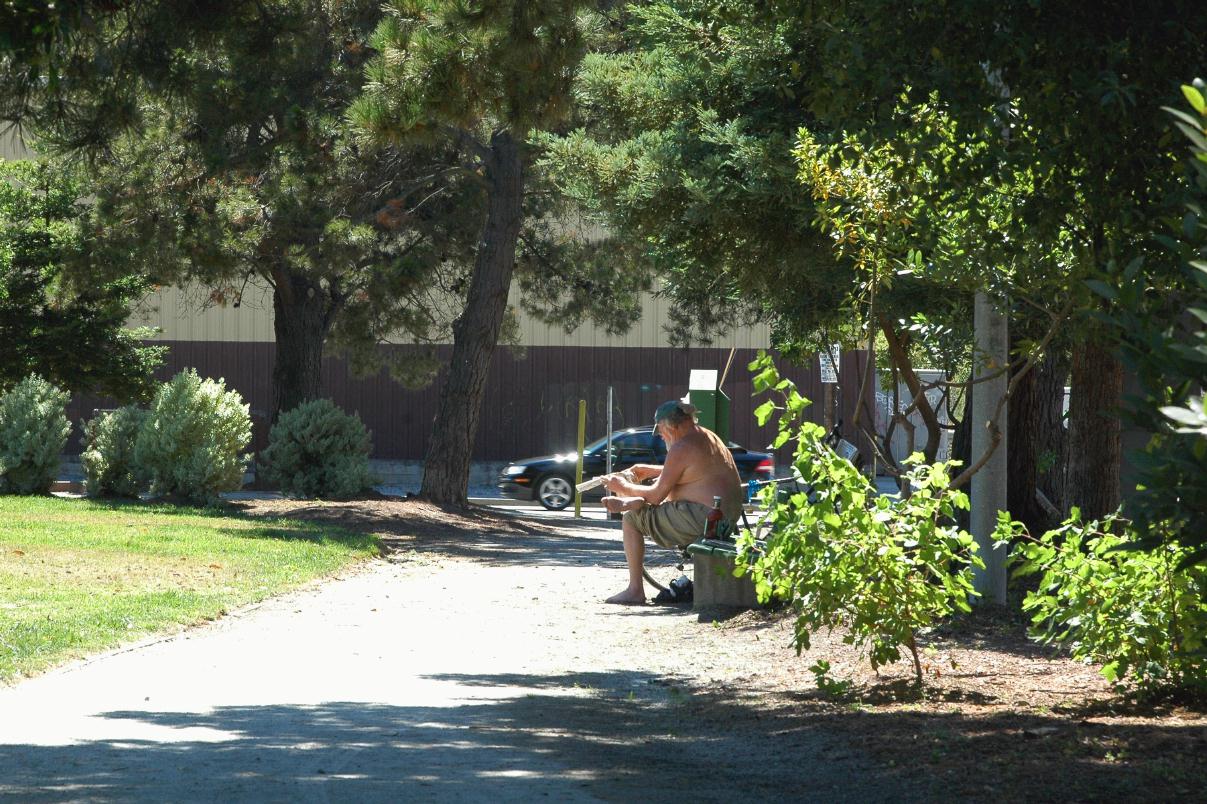 | |
|
"Exercise," Everyman mumbled. "Bah humbug."
He walked home late one night last spring, and growing tired, thought he would shortcut through Esprit Park. A gang of kids soon surrounded him and demanded his money. He handed over the money thinking that would be that, but one of the kids punched him in the face and he fell. The next day Everyman swore he would begin to exercise. Never again, he swore to himself, would he get so tired he would need to shortcut through the park. He took up jogging but got winded. Everyman gave up jogging the next day. A few weeks later, Everyman sufferred a mild heart attack while reaching for extra-fiber bread in Safeway. He was mortified to find himself on the floor, surrounded by other shoppers with concerned looks on their faces. A paramedic gave him oxygen and measured his EKG. "You'd better see a doctor soon," the paramedic said. The next day, Everyman wanted to see a doctor but the expense frightened him so he postponed the idea. "I can always drop into the emergency room," he said to himself. "If things get bad enough." The summer found Everyman less and less able to walk. He tired entirely too easily. It was all he could do some days just to cross the street to the park, where he could rest and read the newspaper. One morning he noticed a two people photographing the park and hoped they wouldn't notice him. He rotated his back toward them, being careful to not spill his bottle of ice tea. "Exercise," Everyman mumbled. "Bah humbug." (2007) Esprit Park, San Francisco, California • Photo posted Friday, July 13, 2007 • © 2007 Bryan Costales 
 #BP20070713.jpg Add a comment or report a mistake
|
|
|
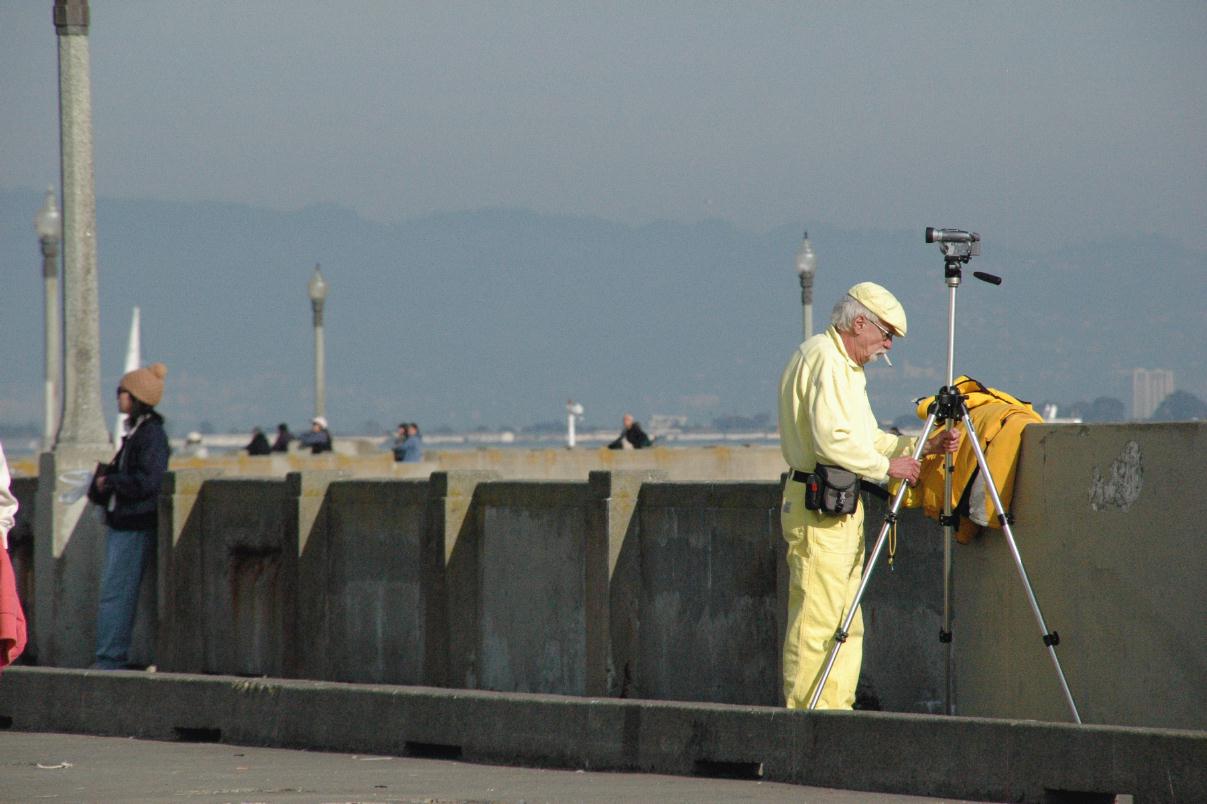 | |
|
Male artists such as photographers, painters, poets, and writers tend to dress
in colorful clothing. Male businessmen and ordinary workers tend to dress in
drab outfits such as grays and blacks.
Perhaps artists have discovered what is known in the bird and animal world, that the male is the one with bright plumage. The peacock is far showier than the peahen, for example. The artist is free to display his feathers. The businessman is not. But look in the closet of a business man and you will find that occasional Hawaiian shirt worn only at picnics and on trips to the Caribbean. Likewise, in the artists closet you will find the occasional grey suit worn only for job interviews and funerals. Each has buried in a closet the trappings of the other's life. Visit the second floor of Macy's mens' store sometime and you will find pre-painted shirts that seem sold right off the backs of artists. At over $US 100 each, the upwardly mobile can now appear to be a working artist. The businessman can now purchase what he lacks in feathers. Perhaps it is because art can free one from the mundane that the artist feels freed from the drab and ordinary. To see and create the unique and unusual must enable a self view that is not embarrassed by the bright but instead revels in it. If you are drab, try making a poem. It won't work, not because you lack a poet in your soul, but because you are drab. Try putting on a bright shirt. If you lack one, wear one of your wife's shirts. How ever you find feathers to wear, put them on now and try writing that poem again. Success? Perhaps. Do the feathers make the artist? Or does the artist wear feathers because he can produce art? (2007) Marina Pier, San Francisco, California • © 2007 Bryan Costales 
 #BP20070714.jpg Add a comment or report a mistake
|
|
|
 | |
|
Jeffrey hated painting that garage door. At his father's insistence,
he painted it every spring, each year applying a bright blue coat over
a freshly sanded surface. It was hard work, and usually hot
in the spring, and Jeffrey was not getting any younger.
Jeffrey's father died when Jeffrey was fifty. After the funeral, Jeffrey swore to himself that he would never again paint that garage door. It could just wither, rot, and fall apart as far as he was concerned. As the years passed, neighbors complained. One summer a petition was given to him with over one hundred names on it demanding he repaint the door. Jeffrey refused. Jeffrey was now getting very old and found it easier to sit on the porch all day than to do most anything else. Nobody asked him to paint anymore, because it was clear he couldn't and because the neighborhood was falling into decay around him. One spring morning a young man stopped and stared at Jeffrey. "What are you looking at?" Jeffrey asked. "Your face is all wrinkled," the boy said. "Just like your door." Jeffrey stood and looked at the door and felt his own face. "You know," he said. "You're right." "Jeez," the boy said. "You're both all used up." Jeffrey considered this for a moment then stepped to the door. "You're right," he said. "To say this door is all used up. You see I haven't painted it in over thirty years. Here. Help me open it." With the boy's help, Jeffrey opened the garage door. As it opened, with a cry of complaining springs, the boy stepped back, amazed. Inside, the garage was chuck full of the most amazing things the boy had ever seen. Mirror balls, and puppets, and stuffed birds, and pinball machines, and skulls, and every sort of wonder. "I collect," said Jeffrey. "And my father collected before me." The boy looked at Jeffrey and in that look Jeffrey saw a look of respect he had not seen in years. The boy thanked him and ran off to tell his friends. Jeffrey closed the garage door and locked it. Then he stood for a while and just looked at the old peeled paint. He felt the garage door with his hand, then felt his own face. Jeffrey walked up his front steps and into his house. He picked up a photo of his father and kissed it. Then he telephoned a local handyman he found listed in the phone book. "Blue," said Jeffrey. "A bright blue, a happy blue, the kind of blue that will bring smiles to the faces of kids that pass by. I want that garage door to look, well, brand new." (2007) San Francisco, California • Photo posted Sunday, July 15, 2007 • © 2007 Bryan Costales 
 #BP20070715.jpg Add a comment or report a mistake
|
|
|
 | |
Imagine what it would be like. You come home one evening after
a hard day's work. You go to your back door to see why your dog
did not greet you. You find the pet door gone. Outside, in
its original place is a small sign reading
Due to rezoning of this area, no pet door may be lower than twenty feet above the ground. You pet door has been relocated.You smack you forehead. "Now," you mutter. "I must replace my dog with a bird." The pet store is particularly not understanding. "No refunds," the skinny clerk says and points to a small sign on the counter We charge a re-stocking fee of %200 for all dogs kept longer than five years.You smack you forehead. "Now," you mutter. "I must sell my dog." You compose your words carefully and put an ad on craigslist For sale, noble Irish setter dog, great with children and well behaved. Best offer.You sell the dog and wait for paypal to come through. The man who bought the dog calls. "I paid good money for that dog. Where do I pick him up?" You are about to answer when you hear a strange noise outside. You say you'll call back and go outside to look. Your dog found the pet door in its new location. Because you were an Army brat, you bury your dog at the Presidio Pet Cemetery. That was a year ago. The man who moved your pet door and put up the sign had been fired. You had to pay back the man that bought the dog and eat the 8% paypal cost. Today you visit your dog's grave and what do you find? (2007) Presidio Pet Cemetery, San Francisco, California • Photo posted Monday, July 16, 2007 • © 2007 Bryan Costales 
 #BP20070716.jpg Add a comment or report a mistake
|
|
|
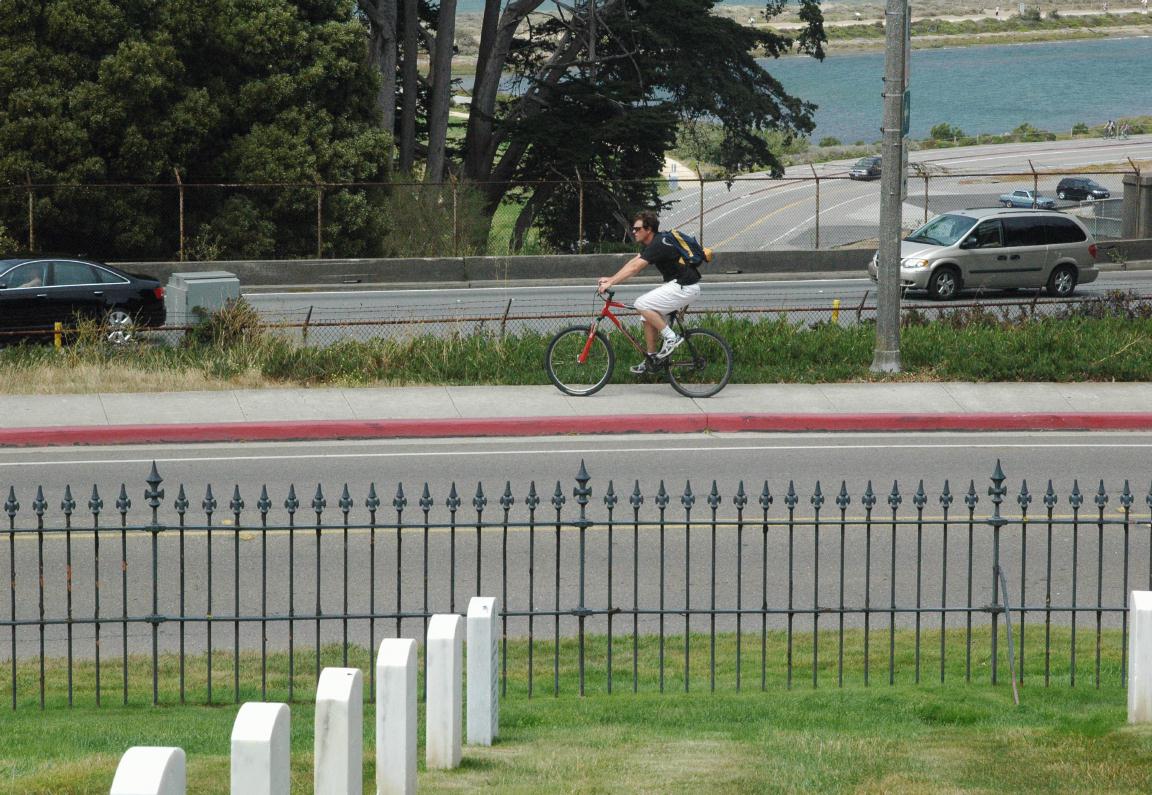 | |
|
That which does not change, becomes invisible.
Consider, for example, a cemetery like the National Cemetery in the Presidio. From day to day, this cemetery changes little, if at all. Driving past it every day, the cemetery soon becomes a constant. A patch of green peppered with white that flashes by, in the corner of the eye while speeding past. If one day a large white tent were to appear in the cemetery, eyes would shift to stare briefly at something new. Of if a brass band were to play, or if mourners were to kneel near the road. But, for the most part, the cemetery never changes, so slowly becomes invisible. Consider other things in your life that, because routine, have become invisible. Perhaps your job, or your car, or your mother or the Sunday funnys. Is it good for some things to become invisible? Does that help us focus on the important things that change? Or, for you, perhaps the important things are the ones that don't change. (2007) National Cemetery, Presidio, San Francisco • © 2007 Bryan Costales 
 #BP20070717.jpg Add a comment or report a mistake
|
|
|
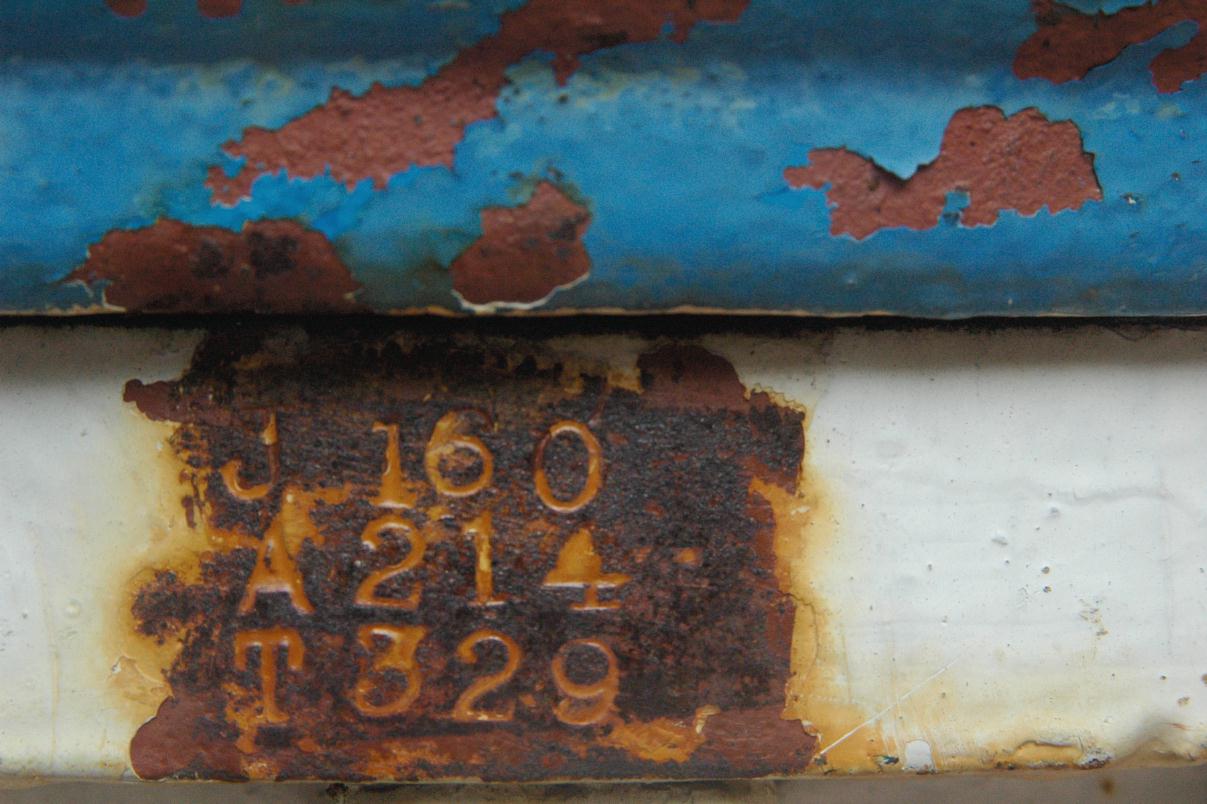 | |
|
Joe swung his hammer hard and missed the nail. In fact
he missed the board entirely and the hammer flew from
his hand. With a wide eyed look on his face he watched
the hammer arc across the alley to strike a fireplug, chipping
paint off.
Joe struggled to his feet and wiped the sweat from his face. The day was hot and the job long. Joe walked to investigate the damage to the fireplug. He looked around to be sure nobody had seen him, then lowered himself to his knees to look close at the damage. Under the chipped paint the metal was already rusted. Joe scratched the paint. He pulled a loose chip off and discovered numbers. "A parts number," was the first thought through his head. Then he noticed that his initials were set into the metal, top down on the left. "Odd," he thought. Joe rubbed the numbers with his index finger and considered them. They didn't appear to be a phone number, too few or too many digits. They weren't his social security number nor his address. "Hmm," he mused. "What could they mean?" With a start he realized the first number, the 165 was his birthday backward, month last. He was born on the sixteenth of May. Joe scratched his head again. His wife's birthday was next, April twenty-first. An he last line was his son's birthday, but right-ways around, March twenty-ninth. Joe heard someone clear his throat behind him and looked up over his shoulder. It was a dark haired man in a black suit. "You weren't supposed to find that," said the man. "Why not?" "If you were to keep chipping paint off you would see your future. You would see when your daughter will be born and when your son will die, and when you will die. And we just cannot allow that." Joe opened his mouth to object, but he could think of no sensible way to reply. The man touched Joe's head with a thin stick that resembled an antenna. Joe swung his hammer hard and hit the nail. Hit is square and drove it all the way in with one blow. He stood and brushed himself off, pleased with a job well done. While putting away his tools he found himself thinking of his daughter, then remembered he didn't have a daughter. "I've spent too much time in the sun," he thought. (2007) Financial District, San Francisco, California • Photo posted Wednesday, July 18, 2007 • © 2007 Bryan Costales 
 #BP20070718.jpg Add a comment or report a mistake
|
|
|
 | |
|
When Nora first saw the house, she was amazed at how long
and tall it was. It ran downhill at least a block and a half,
and was staircased and spooky in its look.
Nora examined again the slip of paper where she had jotted the message. A cheap way to get from San Francisco to New York City, and right now she needed cheap more than comfort. She dropped the paper into her purse and stepped up to the front door. She pressed the doorbell. She heard nothing from inside, but the door clicked and swung inward and open. A long, well lit corridor lay ahead of her, with bright paintings on the walls and fresh flowers in a stand. Nora stepped in and called out, "Hello, hello. I'm here about the trip." No answer. She stepped further in and noticed a small brass sign on the wall. It read, "Cheap Trips, Room 561." Nora found the staircase and climbed to the top floor. There she found room 501. She looked down the corridor and saw many more doors. She groaned and started down the corridor. At the end of the corridor was a dead end, so she went down a floor and into the next building which put her on the fifth floor again. Nora pictured the building as she had seen it from the outside and its staircase look. "Clever," she said. In the last building she finally came to room 561 and found a hand written note on it. "Moved to room 161. This building, bottom floor." Nora shrugged and found the stairs. On the bottom floor room 161 was ajar. She pushed it open and called, "Hi. I'm here about the cheap trip." Again there was no answer, so she entered and found herself a the end of a short hallway with another door at the far end. "Odd," she muttered, and walked to the next door. As she pulled it open, the door behind her slammed shut and made a loud click as if it had been locked. Ahead of her, daylight streamed in, partly blinding her. She stepped out, shading her eyes and looked around. The second door closed and clicked locked behind her. As her eyes adjusted, Nora was surprised to find herself standing on a sidewalk in New York City. San Francisco Walks, Walk number 19 • (2007) Presidio, San Francisco, California • Photo posted Thursday, July 19, 2007 • © 2007 Bryan Costales 
 #BP20070719.jpg Add a comment or report a mistake
|
|
|
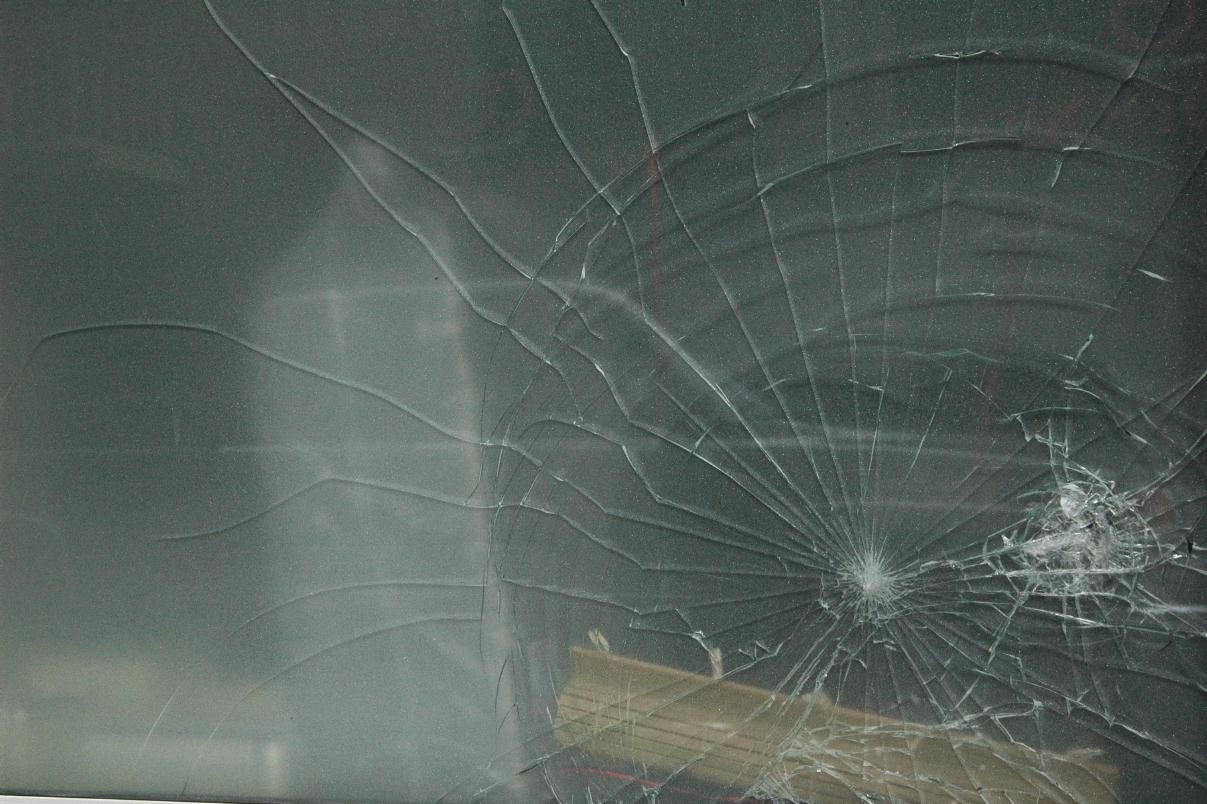 | |
|
Freida was a woman who thought herself the most ugly woman in the world.
She was bald except for hairy warts covering her head. Her face was pocked,
and black hair grew from odd places. She slumped over because of a hump
on her back and she had six fingers on each hand.
Billy was janitor in a small building. All the rooms had mirrored windows so Bill could see out but could not be seen. And Bill loved practical jokes. He mostly liked making faces at those outside who could not see in. Tina considered herself the most beautiful woman in the world. She glided when she walked and seemed to radiate sunshine. Flowers would bloom when she passed and birds would sing. She did not own an umbrella because it never rained when she was outside. Tuesday afternoon Freida met Tina on a corner downtown. They just stood there for moments staring at each other in disbelief. "You're so ugly you must break mirror with your looks," said Tina. Freida laughed with a sound like nails on a blackboard. "And, you're so pretty I bet you could fix those breaks with just a glance." "Yes, I believe I could." Tina smiled. "Are you interested in a contest?" "You're on," said Freida. "Shake on it?" Freida held out her hand, but her six fingers put Tina off. Tina delicately took Freida's littlest little finger and shook that. Billy had just tossed trash in the can when he noticed two women in the street. One was amazingly ugly and the other amazingly pretty. As he watched, the ugly one approached the window and stuck her tongue out at it. Bill wondered why, then remembered that the windows were mirrors on the other side. He thought, "she's so ugly she could crack mirrors." Billy was a jokester and so had a fake window break handy. It was silk screened on clear vinyl and looked realistic. He slapped it on the window right in front of the ugly woman. The pretty woman looked surprised. "My gosh," said Tina. "You did it. You broke the mirror." "Your turn," said Freida and stepped back. Tina approached the window and gave it her biggest and most flashing smile. The break vanished. "Cheap plastic," said Billy. He bent over to pick up the fake crack where it had fallen off the window. He spit on it and rubbed it on his shirt to clean it. The ugly woman was at the window again, so he slapped up the crack again. So it went through several attempts. Freida would break the mirror, then Tina would fix it. The crack would fall off the glass and Bill would put it up again. After a while Tina grew bored and said "Let's just leave it broken and call it a tie." Inside, Billy found some tape and taped the crack up. It was getting late, so he put his things away and left. Outside on the sidewalk he found the two women arguing. "Hey," he said. "I taped up the crack so it won't fall down again. Bye." Billy waved as he walked away. Together, Tina and Freida bent over to examine the crack. Up close they could both see the tape and that the crack was a fake. They laughed. They laughed about the pointless contest. They laughed about the fake crack. But they mostly laughed about themselves. When they were done laughing, Tina took Freida's hand. "Would you like to join me for dinner?" she asked. "Yes. Yes I would." As they walked side by side through the sunset toward dinner, passers-by all had the same thought. "I guess opposites really do attract." But neither Freida nor Tina noticed. The talked between themselves about their upbringing, their families, and the wonderful jokes, that together, they could play on others. (2007) SOMA area, San Francisco, California • © 2007 Bryan Costales 
 #BP20070720.jpg Add a comment or report a mistake
|
|
|
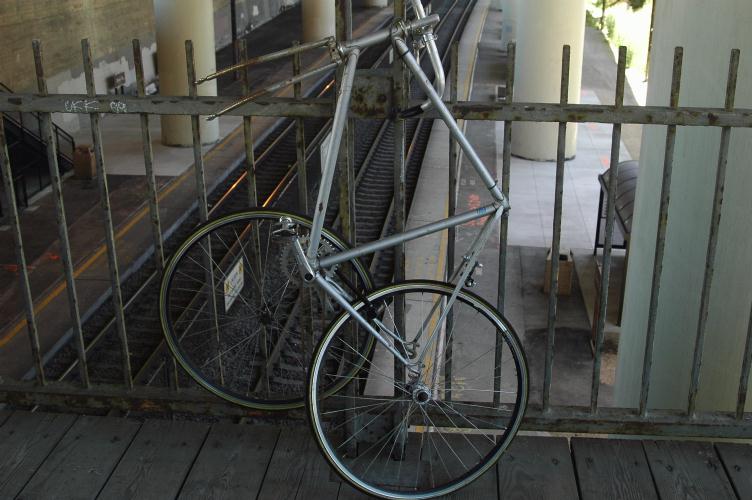 | |
|
Silver was a simple bicycle who sometimes hated himself
because his friends would,
from time to time, taunt him with "Hi ho Silver."
Silver's one weakness was cheap booze, for when he drank
nothing would ever bother him, including he believed,
the taunts of others.
Saturday found Silver cruising down 3rd Street on his way to Dogpatch. He'd heard that a new winerey in Dogpatch was favorable to bicycles and offered all the wine tasting a bicycle could stand. Although Silver lacked a kick stand, he knew how to lean against the bar and guzzle it down with the best of them. When Silver rolled into the winery he was suprised to see that almost everyone he knew had exactly the same idea for the night. All evening it was, "Hi ho Silver," this, and "Hi ho Silver," that. Silver couldn't stand it so drank more and more. Late that evening he was getting really looped. He started to show off. He would roll around the room on his rear tire with his front tire held on his right peddle, while vibrating his forks in tune with the juke box. One dare led to another and before Silver knew what had happend he was rolling alone down 22nd Street toward 3rd. As he crossed the Caltrain tracks he paused to look down. He was still balanced on his rear wheel and felt loopy and crazy. Jump, he thought. Jump to the tracks and tomorrow morning the first train will crush this useless life out of me. But his handle bars were too weak. All Silver managed to do was to catch them on the rail uprights and there he passed out. The next morning a man walked by and shot a photograph of Silver. It appeared on the web and soon Silver found himself traunted by "Hi ho Unicycle." It was better than, "Hi ho Silver," he thought, but not by much. (2007) Dogpatch area, 22nd Street, San Francisco • Photo Posted Saturday, July 21, 2007 • © 2007 Bryan Costales 
 #BP20070721.jpg Add a comment or report a mistake
|
|
|
 | |
|
A thousand years had passed during which wars had been fought,
plagues had scrubbed life clean away, and temperatures had soared
until the seas almost boiled. The next thousand years passed
peacefully because life had been extinguished on earth.
Machines were all that lived. Once built to wage war and now evolved to be self-replicating, they now roamed the new earth like the animals of old. It is into this world that a fresh machine was created, the first to ever be curious about what existed before. His name was an integer five million numbers long. But those close to him called him simply 314 as kind of a joke because of his circular body. 314 reasoned that if he was to solve the mystery of the strange organic objects that littered the landscape, he would have to dig. He convinced a huge excavater to help him. Not one of the new excavaters, of course, but an old one no longer used to search for metal ores. 314 selected a place near the shore of one of the oceans, in a place called Golden because once it was supposed to have an arch of pure metal. The excavater dug where 314 told him and eventually they found more of the organic remains, hard white sticks. He also found stones with symbols carved in them, but beyond that nothing more than what had already been found. 314 rested atop a hill watching the sun set and feeling its power fail for the night. The excavater called to him. 314 hurried down to the dig and there discovered a slice of tree. It was flat and long and colored grey and encased in a primitive plastic. He freed it from the dirt and turned it over. On the other side was a red shape. He had no idea what the shape symbolized but presumed it meant something. 314 looked at the shape with a kind of awe. The his power began to shut down. The sun has set and 314, like all machines, ran on solar energy. After sunset he would power down and hibernate for the night. There on the shore where once the Golden Gate Bridge stood, 314 had discovered a grave stone from the Presidio Pet Cemetery. But he would never comprehend its meaning, because 314 was cold blooded like reptiles before him. In his machine chest beat no heart. Another thousand years would pass before other machines would first postulate warm blooded life, and before other machines would translate old writing. 314 had been recycled centuries before when the symbol on the board he found was finally recognized as the symbol for a warm blooded creature's heart. (2007) Presidio Pet Cemetery, Presidio, San Francisco • Photo posted Sunday, July 22, 2007 • © 2007 Bryan Costales 
 #BP20070722.jpg Add a comment or report a mistake
|
|
|
 | |
|
The difference between a boat and a ship is just one of scale.
Few would disagree with the assertion that this is a boat.
It is powered by oars and is too small in which to stand safely.
A boy can become a man. A girl can become a Woman. A joey can become a kangaroo. But a row boat can never become ship. Yet the process of rowing a row boat can elvate a boy into a man, or a husband into a hero. Yes, the row boat can itself elevate but can never itsef become elevated. Some retrofit row boats with sails and create sailing dinghy. But a sailing dinghy is still not a ship, even though it can sail the oceans.
Some will put a motor on a row boat
Is the row boat doomed to forever be a boat? Is there no hope
at all for this loyal workhorse? No, sadly, but no. But at the end of its
days it can still find other uses
So join me in singing the row boat's theme song. And drink a shot of rum to its honor: Row, row, row your boat, merrily up the stream. Merrily, merrily, merrily, life is but a dream. (2007) Stow Lake, Golden Gate Park, San Francisco • Photo posted July 1, 2007 • © 2007 Bryan Costales 
 #BP20070701.jpg Add a comment or report a mistake
|
|
|
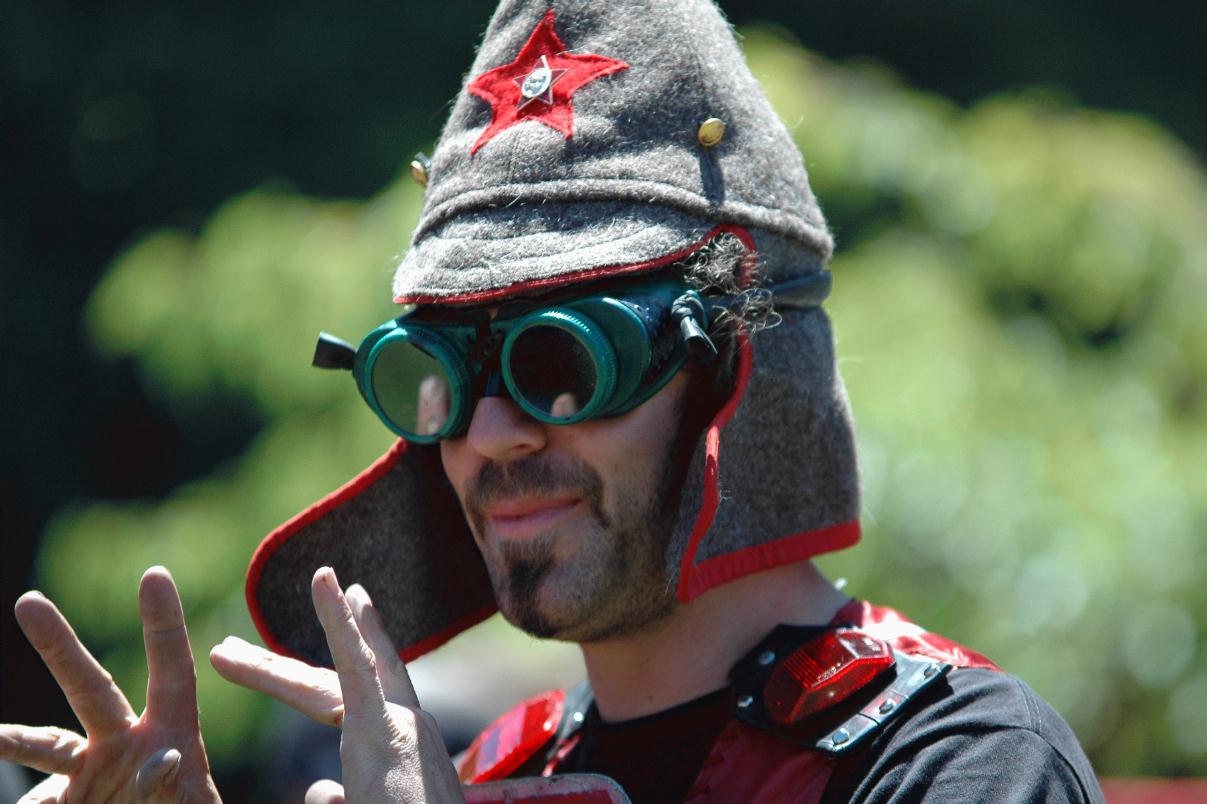 | |
|
And so it went, and went, and went.
Communism. Beginning in the 50's, if a person walked around in a communist hat he risked being beaten up. Nowadays, however, a communist hat is nothing more than an funny looking piece of headwear. Once an object that would illicit rage, a commie hat is now a mere curiosity. In the 30s during prohibition a person might be beaten up for drinking in public (even in a tavern). Nowadays, however, a drink in the hand might at most raise eyebrows. Once an object that would illicit rage, a drink is now a mere curiosity. Early this century same sex couples could marry in San Francisco. Because of that, Mayor Newsom was routinely beaten up. Now, however, Massachusetts has legalized same sex marriage. Once an object that would illicit rage, now same-sex marriage is gradually becoming a mere curiosity. Thirty years from now, a phrase, or bit of clothing, or opinion, or possession will cause you to be beaten up. A decade or two later, your prior offense will become old hat. Once an object becomes what will illicit rage, that same object will later become a mere curiosity. And so it goes, and goes, and goes. (2007) Tour de Fat, Speedway Meadows, San Francisco • Photo posted Tuesday, July 24, 2007 • © 2007 Bryan Costales 
 #BP20070724.jpg Add a comment or report a mistake
|
|
|
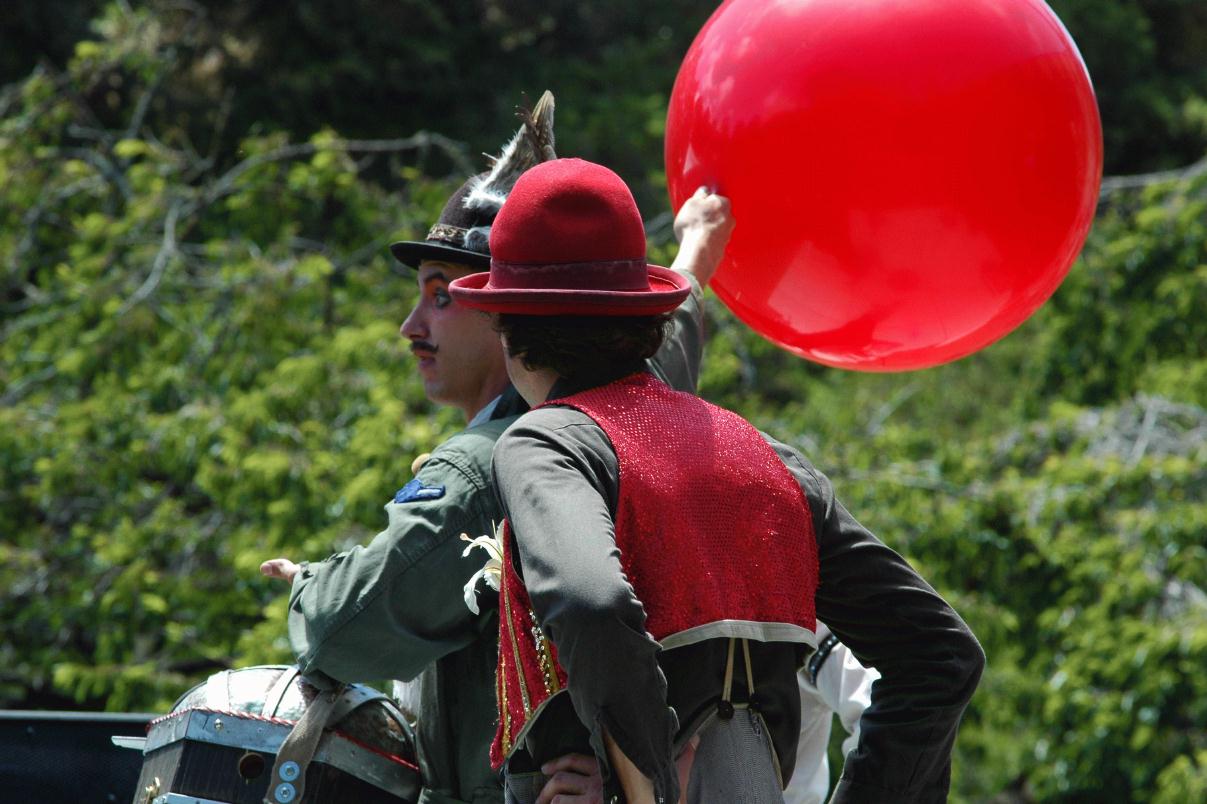 | |
|
There once was a balloon which was huge, bright red and, at the
same time, invisible. Now this might seem like a contradiction, but
situations like this can sometimes exist in the world of magic.
A great and powerful magician was working the crowd one fine sunny afternoon in the City. His wife could not believe how dull he was playing so she came on stage and yelled at him. "You lout, you fool." She shook her fist, "Did you drink last night? Are you stoned? Why do you bore this audience so?" The magician paused in mid trick and turned to her. "My wife of such wit and talent. Can you not see," he gestured at the audience. They are rolling in the aisles in laughter." His wife glared at the audience then at him. "They are not laughing. They are booing and throwing tomatoes at us." And with that, a huge tomato sailed past to spat on the back wall. The magician turned again to the audience. "You see," he announced in a voice that projected into the next century. "Half of you see only my wife and are bored by her shouting. The other half of you see only me and this bright red balloon and are laughing." "What red balloon?" asked his wife. "I don't see any balloon." "To see the balloon," said the Magician. "You must make the audience laugh." His wife ducked a near miss tomato, then put her hands on her hips and thought. "I know," she said aloud. She took a tumble. She juggled hats. She told a joke. Finally the audience laughed, and with their laughter the balloon appeared. Where there had been two audiences, there was now one large audience. Members of each audience ogled the other. Where a man thought he had been stood up, his girlfriend appeared. Where a father thought his daughters had stayed home, they too appeared. Families and lovers were reunited. So impressed was the audience with the Magician's magic, they now threw money instead of tomatoes. His wife kissed him which caused him to release the balloon. The balloon floated upward into the sky. As it rose higher and higher it became smaller and smaller. At last the huge red balloon became so distant and small it became invisible again. Only this time the whole audience could watch it vanish, together. (2007) Circus Contraption, San Francisco, California • Photo posted Wednesday, July 25, 2007 • © 2007 Bryan Costales 
 #BP20070725.jpg Add a comment or report a mistake
|
|
|
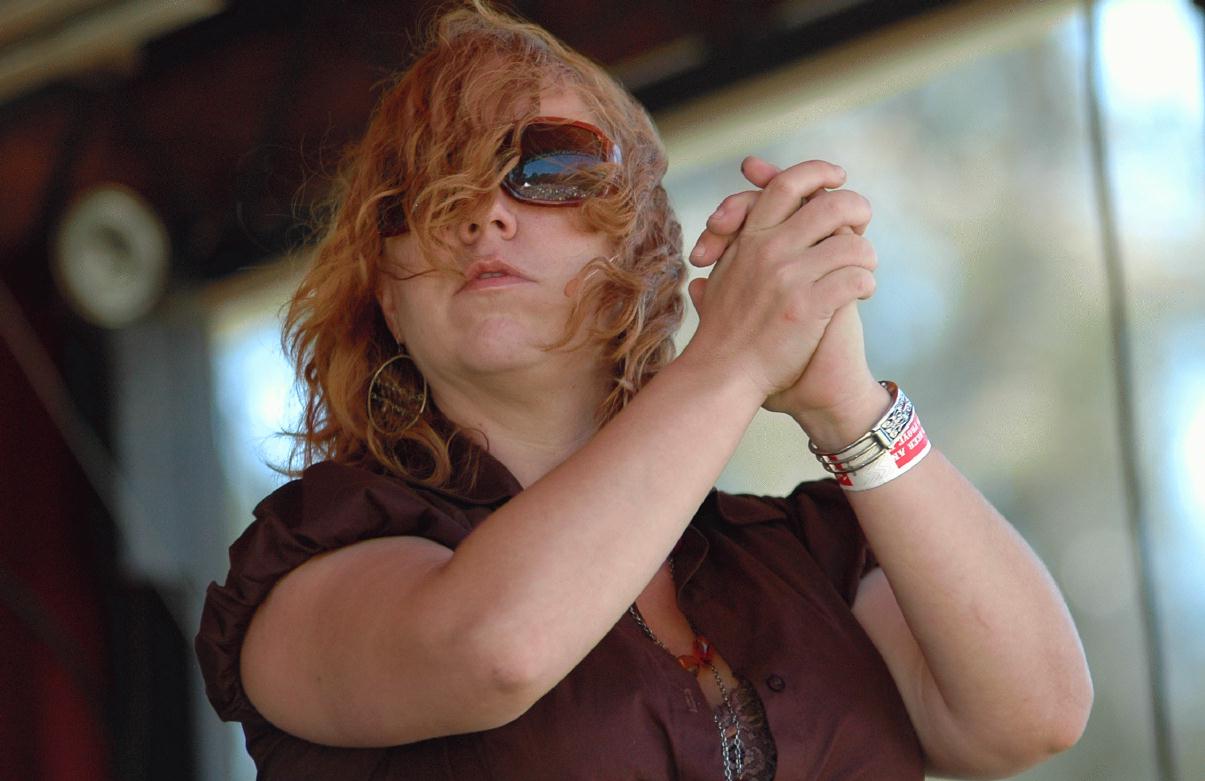 | |
|
All performers love the sound of applause.
When many people
clap with the same timing that is called clapping to the song.
Applause is the the
sound of many people clapping asynchronously.
But why should only performers love the sound of applause? Don't we all, upon doing something well, crave applause too? When your son comes home with an A on his report card, you can hug him, and praise him and gush over how well he as done. But wouldn't it be ever so much nicer to applaud? Imagine his broad smile and his happy bow in return. An employee turns in an important report early and in perfect order. You could praise that employee, perhaps offering the afternoon off or something extra at Christmas bonus time. But imagine how much better it would be to applaud that employee. Even better, call others from adjoining offices and all applaud that employee together. Your brother wants you to speak at his wedding. You might tell jokes about his youth, or speak kindly about his bride, or wax philosophic about their future together. But imagine the joy you can cause by clapping and saying, "How about that brother of mine and his beautiful wife. Come on, everyone. Give it up for my brother." What a wedding speech to remember, indeed, when the couple receives a standing ovation. Many opportunities arise throughout every day to applaud someone. No matter how small the accomplishment, a thing well done deserves applause. When alone, one person clapping may seem like nothing. But when the clapping is the reward, all clapping no matter how humble becomes applause. The Asylum Street Spankers Band • (2007) Tour De Fat, Speedway Meadows, San Francisco • Photo posted Thursday, July 26, 2007 • © 2007 Bryan Costales 
 #BP20070726.jpg Add a comment or report a mistake
|
|
|
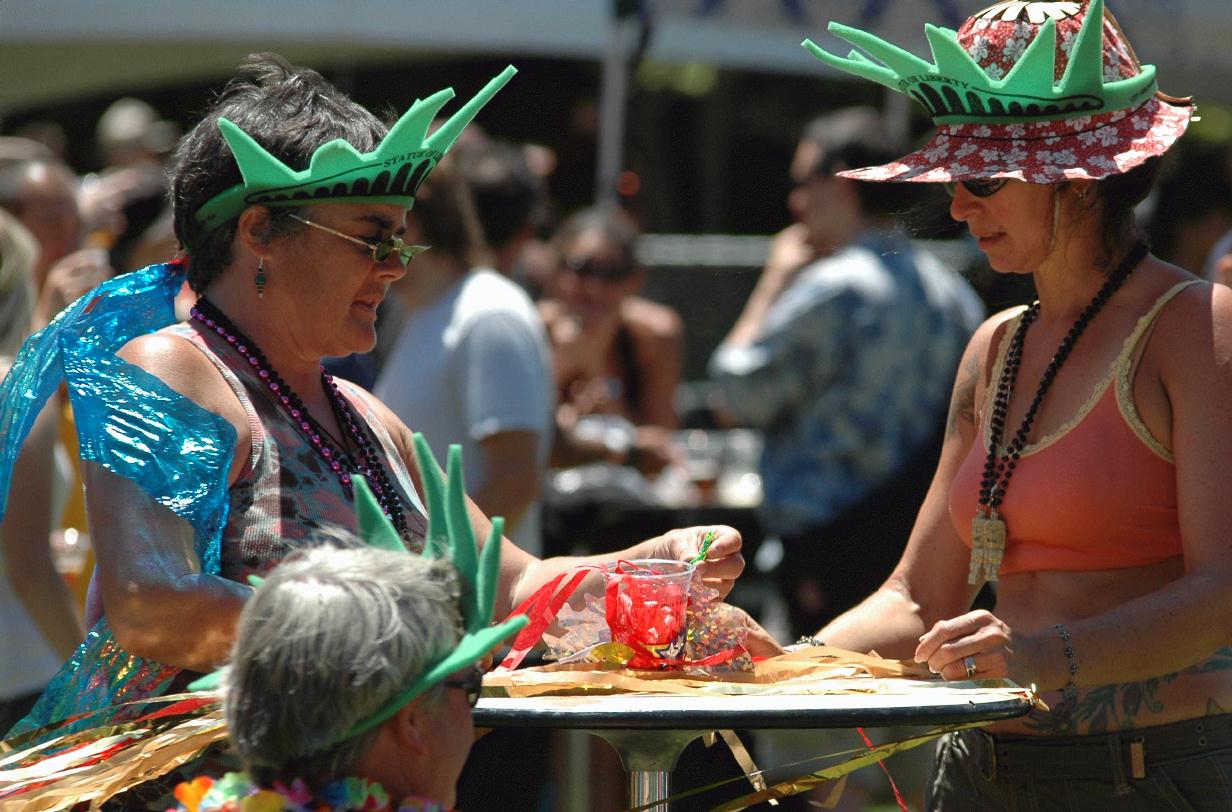 | |
|
The Statue of Liberty wears a crown with seven spikes.
Those seven spikes are supposed to represent either the
seven seas or the seven continents.
Americans have never had royalty that they could emulate as their own.
The closest thing to a crown wearer is the Statue of Liberty.
Often at fairs and ballgames, women and girls will wear the crown of liberty. They do this because no man would be caught dead wearing Washington's wig to the same events. So next time you see Liberty's crown worn at a fair, or festival, or game, or outdoor event of any kind, look upon it with the respect is deserves. Tour De Fat Festival • Photo Posted Friday, July 27, 2007 • (2007) Speedway Meadows, San Francisco, California • © 2007 Bryan Costales 
 #BP20070727.jpg Add a comment or report a mistake
|
|
|
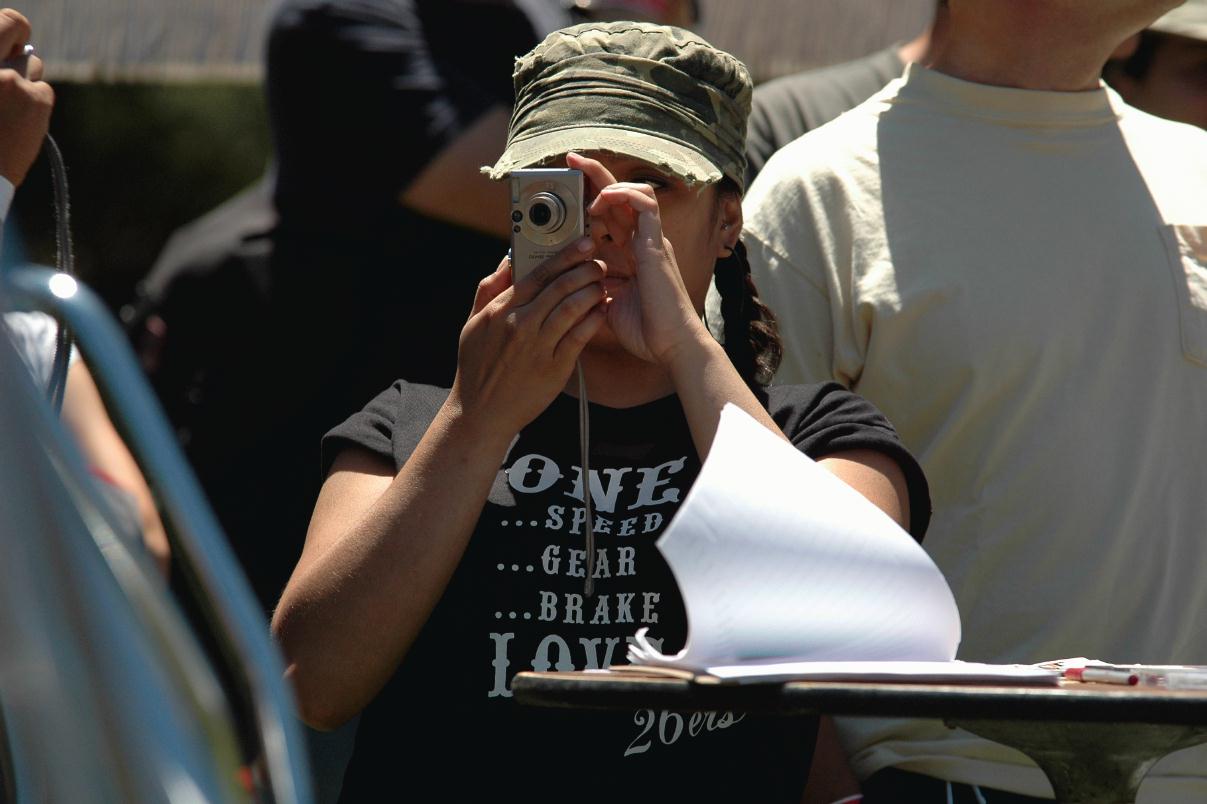 | |
|
A horizontal rectangle is not the only format for a photographic image. Perhaps we have become accustomed
to that shape because of the common experience of television. But other shapes are equally valid.
Wide horizontal shots may be dictated by the subject
At the other extreme is the very tall photograph. Sometimes tall is a requirement of the
subject taken
Round can be handy when viewing fisheye shots, but might also be appropriate for round frames. Round has the advantage of being neither tall nor wide and is one means to avoid debate. The debate between vertical and horizontal shots is just a matter of taste. What tastes best to one may seem sour to another. Neither is right and neither is wrong. What is right is the way each individual photographer sees the world.
We, at bcx.news, stand for displaying each work in the best and most
attractive manner possible. Sure, sometimes we fail, but that is why
feedback was invented, wail at us, or applaud.
(2007) Tour De Fat, San Francisco, California • Photo Posted Saturday, July 28, 2007 • © 2007 Bryan Costales 
 #BP20070728.jpg Add a comment or report a mistake
|
|
|
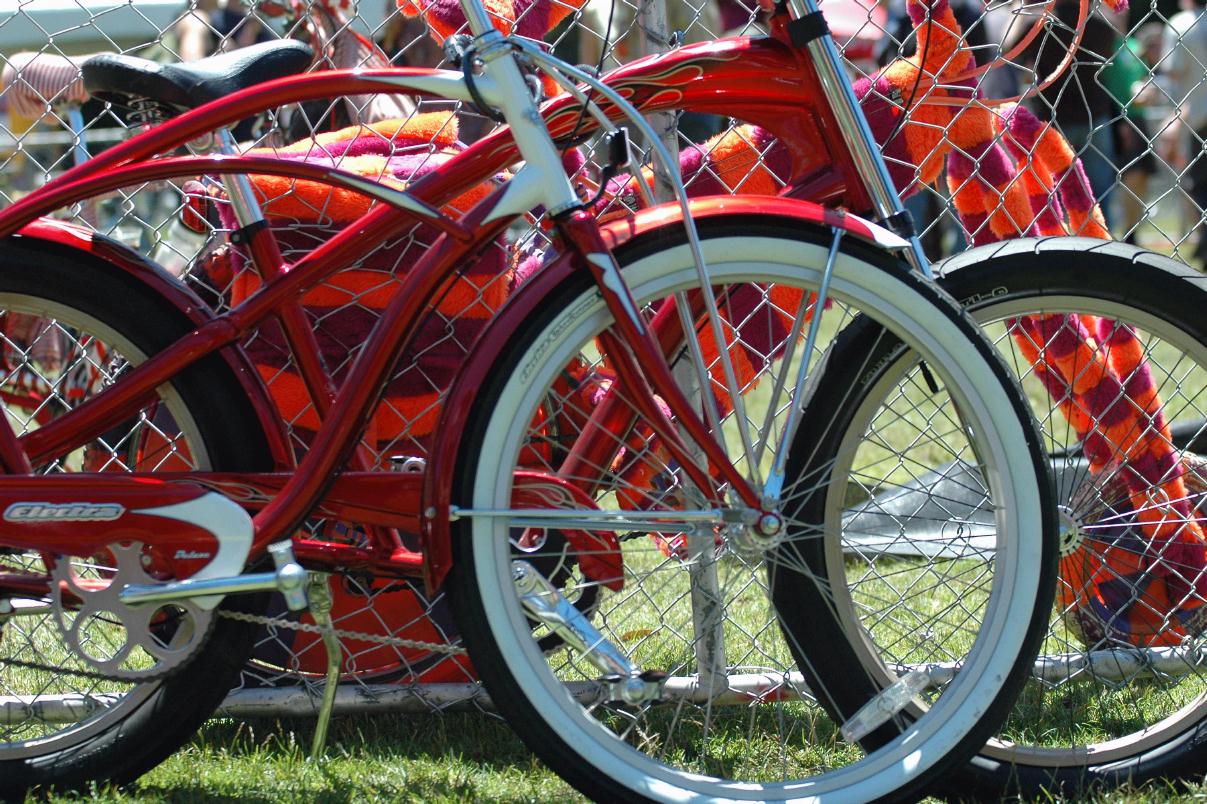 | |
|
Once there was a planet of bicycle beings who, like the planet
of humans, had downtrodden masses and their leaders.
Custard was a young red bicycle with
chrome undiminished by years. His bright sidewalls wowed the
females and his tough manner caused others to revere him as
leader.
He called a meeting of all the red bicycles and laid before them the prospect of battle. "Oh suffering reds," he shouted. "How much longer can we stand playing second to the selfish nobility of greens? Not another year, I say. Not another week. No. Not ever another minute. I say arise! Arise with me and let us overthrow those evil greens." A cacophony of honks and dings showed him he had successfully made his point. "To Green City," called Custard and he rolled off. Behind him the sound of ten thousand squeaking wheels followed, all of them red. As they moved across the country, more and more red bicycles joined. As Custard neared Green City his force had grown to one million strong. The first sign of trouble happened as they neared Green City. It was surrounded by a maze of fences and, being bicycles, they could not climb over the fences. Custard led his force through the maze and toward the heart of the city. The maze was long but the red forces did not tire. As Custard neared the city the maze gradually narrowed. Eventually Custard found himself traveling down the last length of the maze wide enough only for him and his second. Only then did Custard realize his folly. Custard lowered his kickstand to show that he yielded. Behind him came the sickening sound of a million kickstands lowering. On the planet of the bicycles, that day became known as "Custard's last stand." (2007) Tour de Fat, San Francisco, California • Photo Posted Sunday, July 29, 2007 • © 2007 Bryan Costales 
 #BP20070729.jpg Add a comment or report a mistake
|
|
|
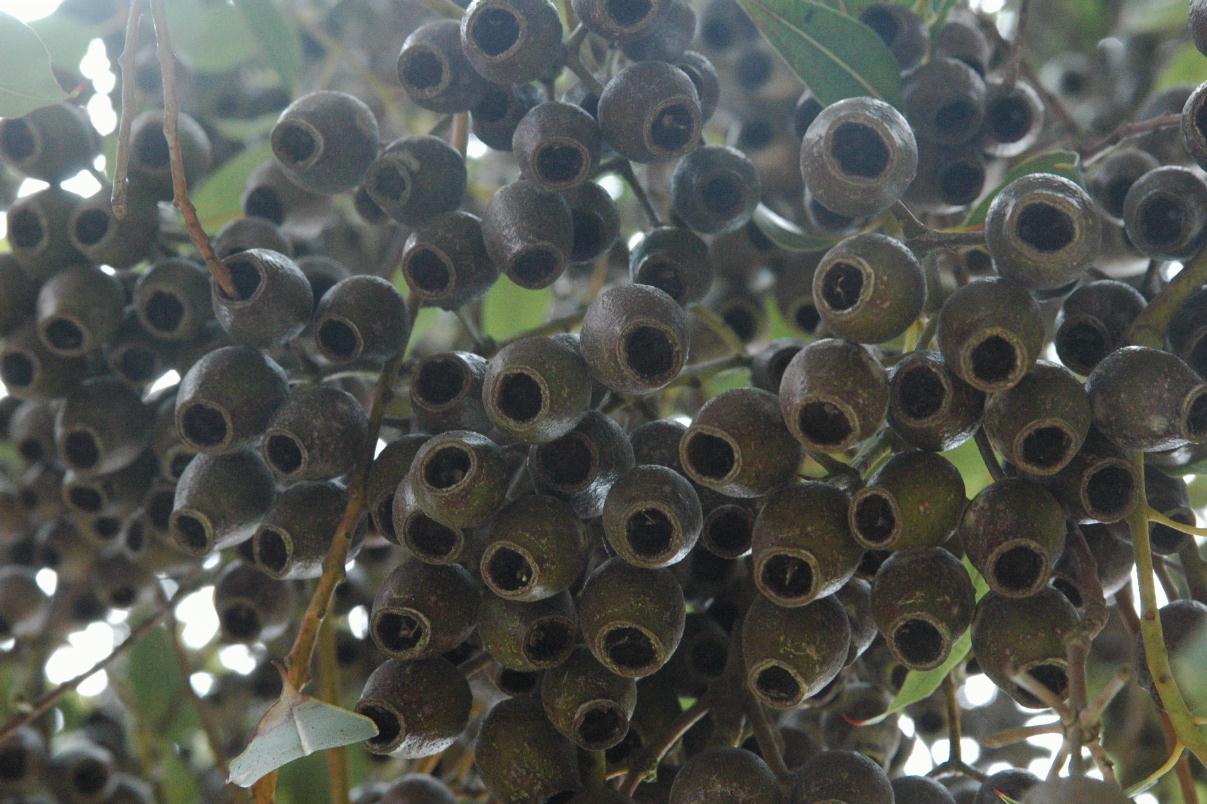 | |
|
Josh Hoffer was homeless and slept under the
train crossing. He didn't mind the noise of the midnight
freight because the crossing kept him warm and
dry even if it rained. Because of Josh's location,
at the edge of town, he was the first to notice the
new tree.
An unusually hard rain fell that night. It hammered roofs and caused gutters to run like small rivers. It had started, as if from nowhere, at four in the morning, and ended just as quickly at five, just before dawn. Josh woke and stretched and scratched himself as usual. He wondered if he had any wine left and felt vaguely hungry. Out in the field that paralleled the train tracks was a dirt path on which people jogged each morning. Josh didn't jog, but he enjoyed watching the women in shorts running each morning. Two joggers, a man and woman, slowed as they approached the new and strange tree. They stopped and talked about it between themselves. The tree was the same size as the dozens of walnut trees that dotted the field. It lacked leaves, and in place of leaves had strange dark seed pods. Hand in hand, the couple approached the tree, stood under it and looked up at the pods. In the blink of an eye, two pods grew huge and each sucked up one of the joggers. Just that fast, both joggers were gone and the tree appeared unchanged. Josh decided he's been drinking too much and had the DTs. He dug through his boxes and found a small bottle of rum with a sip still at the bottom. Josh finished the rum with a gulp and noticed screaming in the field. A man with a dog leash on his wrist was calling on a cellphone. His wife was screaming and jumping up and down and pointing at the tree. Josh decided to head into town to try to find some food. A man coming out of MacDonalds gave him a breakfast burger. Outside Starbucks he found an almost full coffee upright in the garbage. After breakfast, Josh thought he would head "home" for a nap under the tracks. Josh found the field full of police cars, all with lights flashing but nobody around. The lack of people made Josh mad. If the tree took all the people how would he eat? Josh dug through his belongings and found a screw driver. He wrapped several empty bottles in an old shirt and hauled it all to the police car furthest from the tree. Using the screw driver, Josh punctured the gas tank and quickly filled all his bottles. He ripped the shirt into small strips and stuffed a strip into the neck of each bottle. Pleased with his Molotov cocktails, Josh lit one and threw it at the tree. The bottle burst and spread burning gasoline over part of the tree. Josh watched and waited. Nothing happened for a long while, so Josh thought the flames had no effect. Then there was a loud pop. In a blink, two policemen appeared under the tree. Both took a beat to get their bearings, then ran out from under the tree, far out from under it. Encouraged, Josh lit and threw another bottle. It burned and two more pops yielded two more police. Soon the freed police were tossing Molotov cocktails alongside Josh. More people popped free, then dogs and birds and squirrels. Josh felt tired so he retreated to his home under the tracks. He rummaged around and found a half-full bottle of red wine, which felt like a miracle to him. He unscrewed the lid and drank it all. Sufficiently relaxed, Josh laid down and slept. He slept deeply all night and woke up refreshed the next day. Curious, he got to his feet and walked out to look at the tree. The tree was gone. Not even a stump remained. A young woman jogged by. Josh watched her with pleasure then scratched his head and wondered where he would find food for breakfast. END (2007) Presidio, San Francisco, California • Photo Posted Monday, July 30, 2007 • © 2007 Bryan Costales 
 #BP20070730.jpg Add a comment or report a mistake
|
|
|
 | |
|
When you first visit the
Grand Canyon you can only appreciate its size because you already know it is huge. But a real sense of its size cannot be understood until you view people far below
hiking on a trail. In that instant the mammoth nature of the Grand Canyon snaps into reality.
The human mind cannot judge size without something of a known size against which to reference. Imagine laying on the grass looking at fluffy white clouds floating overhead. Is a given cloud huge and distant, or small and near. How do you judge? High in the mountains you can turn your head and spot a cloud hugging a nearby hill. With the hill and trees in your view, the size of the cloud can be more accurately judged. The Eiffel Tower looks like a toy. when viewed from most parts of Paris. But as you approach it on foot you first see the river and boats and roads with busses and cars, and the Eiffel Tower seems much larger. As you get closer you can spot people high up on its platforms and the Eiffel Tower seems even bigger.
So too with kites. In this picture
When presenting a photo essay about an event, try to always include a shot or two that illustrates the actual distance and sizes of things. People work best, but other known items work just as well, such as cars and horses. Berkeley Kite Festival • (2007) Caesar Chavez Park, Berkeley, California • Photo Posted Tuesday, July 31, 2007 • © 2007 Bryan Costales 
 #BP20070731.jpg Add a comment or report a mistake
|
|
 |
| home • contact • topic guide • top 25 • photos • video • writing • blogs • upload • terms • privacy |